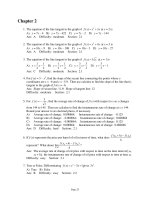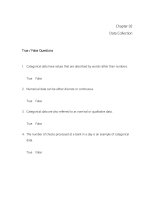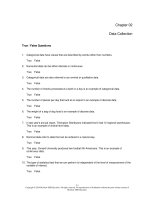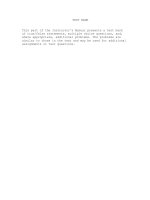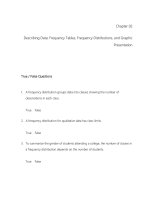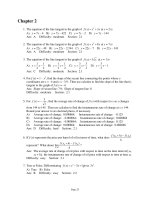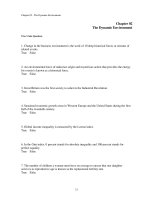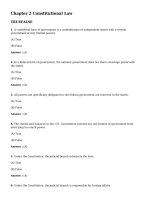Law business and society 11th edition mcadams test bank
Bạn đang xem bản rút gọn của tài liệu. Xem và tải ngay bản đầy đủ của tài liệu tại đây (276.48 KB, 22 trang )
Chapter 02 – Business Ethics
Chapter 02
Business Ethics
True/False Questions
1. In the context of libertarianism, justice and fairness, right and wrong are measured not by
equality of results for all but from ensuring equal opportunity for all to engage in informed
choices about their own welfare.
Answer: True
AACSB: Analytical Thinking
Blooms: Remember
Difficulty: 1 Easy
Learning Objective: 02-03 Discuss the leading ethical decision-making theories.
Topic: Ethics Theories
Feedback: Justice and fairness, right and wrong are measured not by equality of results (such
as wealth) for all but from ensuring equal opportunity for all to engage in informed choices
about their own welfare. Hence, philosopher Robert Nozick took essentially a free market
stance toward ethics.
2. Virtue ethics applauds the person who is motivated to do the right thing and who cultivates
that motivation in daily conduct.
Answer: True
AACSB: Ethics
Blooms: Remember
Difficulty: 1 Easy
Learning Objective: 02-03 Discuss the leading ethical decision-making theories.
Topic: Ethics Theories
Feedback: Virtue ethics applauds the person who is motivated to do the right thing and who
cultivates that motivation in daily conduct. A part of the argument is that such persons are
more morally reliable than those who simply follow the rules but fail to inspect, strengthen,
and preserve their own personal virtues.
3. To the deontologist, the end is primary and that end or result is the measure of the ethical
quality of a decision or act.
Answer: False
AACSB: Analytical Thinking
AACSB: Ethics
Blooms: Remember
Difficulty: 1 Easy
Learning Objective: 02-04 Distinguish between teleological and deontological ethical
systems.
Topic: Ethics Theories
© 2015 by McGraw-Hill Education. This is proprietary material solely for authorized instructor use. Not
authorized for sale or distribution in any manner. This document may not be copied, scanned, duplicated,
forwarded, distributed, or posted on a website, in whole or part.
Chapter 02 – Business Ethics
Feedback: For the teleologist or consequentialist, the end is primary and that end or result is
the measure of the ethical quality of a decision or act. To the deontologist, on the other hand,
principle is primary and consequence is secondary or even irrelevant.
4. Kant believed that every rational creature can act according to his or her categorical
imperative because all such persons have “autonomous, self-legislating wills” that permit
them to formulate and act on their own systems of rules.
Answer: True
AACSB: Analytical Thinking
Blooms: Remember
Difficulty: 1 Easy
Learning Objective: 02-04 Distinguish between teleological and deontological ethical
systems.
Topic: Ethics Theories
Feedback: Kant believed that every rational creature can act according to his or her
categorical imperative because all such persons have “autonomous, self-legislating wills” that
permit them to formulate and act on their own systems of rules. To Kant, what is right for one
is right for all, and each of us can discover that “right” by exercising our rational faculties.
5. A moral rule is “categorical” rather than “hypothetical” in that its prescriptive force is
independent of its consequences.
Answer: True
AACSB: Analytical Thinking
Blooms: Remember
Difficulty: 1 Easy
Learning Objective: 02-04 Distinguish between teleological and deontological ethical
systems.
Topic: Ethics Theories
Feedback: A moral rule is “categorical” rather than “hypothetical” in that its prescriptive
force is independent of its consequences. The rule guides us independent of the ends we seek.
6. Maximizing right rather than good is the teleological standard.
Answer: False
AACSB: Analytical Thinking
Blooms: Remember
Difficulty: 1 Easy
Learning Objective: 02-04 Distinguish between teleological and deontological ethical
systems.
Topic: Ethics Theories
Feedback: Maximizing right rather than good is the deontological standard. The deontologist
might well refuse to lie, as a matter of principle, even if lying would maximize good.
7. According to act-utilitarianism, our goal is to identify the consequences of a particular act
to determine whether it is right or wrong.
Answer: True
© 2015 by McGraw-Hill Education. This is proprietary material solely for authorized instructor use. Not
authorized for sale or distribution in any manner. This document may not be copied, scanned, duplicated,
forwarded, distributed, or posted on a website, in whole or part.
Chapter 02 – Business Ethics
AACSB: Analytical Thinking
Blooms: Remember
Difficulty: 1 Easy
Learning Objective: 02-05 Distinguish utilitarianism and formalism.
Topic: Ethics Theories
Feedback: According to act-utilitarianism, our goal is to identify the consequences of a
particular act to determine whether it is right or wrong. Rule-utilitarianism requires us to
follow those rules that generate the greatest value for society.
8. Formalism requires us to follow those rules that generate the greatest value for society.
Answer: False
AACSB: Analytical Thinking
Blooms: Remember
Difficulty: 1 Easy
Learning Objective: 02-05 Distinguish utilitarianism and formalism.
Topic: Ethics Theories
Feedback: Rule-utilitarianism requires us to follow those rules that generate the greatest value
for society. The rule-utilitarian may be forced to shun a particular act that would result in
greater immediate good (punishing a guilty person whose constitutional rights have been
violated) in favor of upholding a broader rule that results in the greater total good over time
(maintaining constitutional principles by freeing the guilty person).
9. The emotion or intuition approach claims that moral decision making is an automatic,
nonreflective process in which our minds, when confronted with a moral question,
instantaneously generate feelings of approval or disapproval.
Answer: True
AACSB: Ethics
Blooms: Remember
Difficulty: 1 Easy
Learning Objective: 02-06 Describe Kohlberg’s theory of moral development.
Topic: Why Do Some Managers Cheat?
Feedback: The emotion or intuition approach claims that moral decision making is an
automatic, nonreflective process in which our minds, when confronted with a moral question,
instantaneously generate feelings of approval or disapproval. Some scientists speculate that
controlled moral reasoning may be little more than an after-the-fact method of justifying
conclusions already reached automatically via emotions or intuitions.
10. A danger in the ethic of care is that it might be interpreted to restore and legitimize the
stereotype of women as care giving subordinates not deserving of moral autonomy.
Answer: True
AACSB: Analytical Thinking
Blooms: Remember
Difficulty: 1 Easy
Learning Objective: 02-06 Describe Kohlberg’s theory of moral development.
Topic: Why Do Some Managers Cheat?
© 2015 by McGraw-Hill Education. This is proprietary material solely for authorized instructor use. Not
authorized for sale or distribution in any manner. This document may not be copied, scanned, duplicated,
forwarded, distributed, or posted on a website, in whole or part.
Chapter 02 – Business Ethics
Feedback: Kohlberg’s initial experimental subjects were limited to young males. The result,
in Gilligan’s view, is that women are underscored. Of course, a danger in the ethic of care is
that it might be interpreted to restore and legitimize the stereotype of women as care giving
subordinates not deserving of moral autonomy.
11. Moral identity involves the degree to which moral concerns are central to our sense of
self.
Answer: True
AACSB: Ethics
Blooms: Remember
Difficulty: 1 Easy
Learning Objective: 02-06 Describe Kohlberg’s theory of moral development.
Topic: Why Do Some Managers Cheat?
Feedback: Early evidence suggests that a critical feature in total moral development,
including the will to act, involves what is labeled moral identity. In general, moral identity
involves the degree to which moral concerns are central to our sense of self.
12. Organizational culture does not influence corporate misconduct.
Answer: False
AACSB: Analytical Thinking
Blooms: Remember
Difficulty: 1 Easy
Learning Objective: 02-07 Des��������������������������������������������������������������������������������������������������������������������������������������������������������������������������������������������������������������������������������������������������������������������������������������������������������������������������������������������������������������������������������������������������������������������������������������������������������������������������������������������������������������������������������������������������������������������������������������������������������������������������������������������������������������������������������������������������������������������������������������������������������������������������������������������������������������������������������������������������������������������������������������������������������������������������������������������������������������������������������������������������������������������������������������������������������������������������������������������������������������������������������������������������������������������������������������������������������������������������������������������������������������������������������������������������������������������������������������������������������������������������������������������������������������������������������������������������������������������������������������������������������������������������������������������������������������������������������������������������������������������������������������������������������������������������������������������������������������������������������������������������������������������������������������������������������������������������������������������������������������������������������������������������������������������������������������������������������������������������������������������������������������������������������������������������������������������������������������������������������������������������������������������������������������������������������������������������������������������������������������������������������������������������������������������������������������������������������������������������������������������������������������������������������������������������������������������������������������������������������������������������������������������������������������������������������������������������������������������������������������������������������������������������������������������������������������������������������������������������������������������������������������������������������������������������������������������������������������������������������������������������������������������������������������������������������������������������������������������������������������������������������������������������������������������������������������������������������������������������������������������������������������������������������������������������������������������������������������������������������������������������������������������������������������������������������������������������������������������������������������������������������������������������������������������������������������������������������������������������������������������������������������������������������������������������������������������������������������������������������������������������������������������������������������������������������������������������������������������������������������������������������������������������������������������������������������������������������������������������������������������������������������������������������������������������������������������������������������������������������������������������������������������������������������������������������������������������������������������������������������������������������������������������������������������������������������������������������������������������������������������������������������������������������������������������������������������������������������������������������������������������������������������������������������������������������������������������������������������������������������������������������������������������������������������������������������������������������������������������������������������������������������������������������������������������������������������������������������������������������������������������������������������������������������������������������������������������������������������������������������������������������������������������������������������������������������������������������������������������������������������������������������������������������������������������������������������������������������������������������������������������������������������������������������������������������������������������������������������������������������������������������������������������������������������������������������������������������������������������������������������������������������������������������������������������������������������������������������������������������������������������������������������������������������������������������������������������������������������������������������������������������������������������������������������������������������������������������������������������������������������������������������������������������������������������������������������������������������������������������������������������������������������������������������������������������������������������������������������������������������������������������������������������������������������������������������������������������������������������������������������������������������������������������������������������������������������������������������������������������������������������������������������������������������������������������������������������������������������������������������������������������������������������������������������������������������������������������������������������������������������������������������������������������������������������������������������������������������������������������������������������������������������������������������������������������������������������������������������������������������������������������������������������������������������������������������������������������������������������������������������������������������������������������������������������������������������������������������������������������������������������������������������������������������������������������������������������������������������������������������������������������������������������������������������������������������������������������������������������������������������������������������������������������������������������������������������������������������������������������������������������������������������������������������������������������������������������������������������������������������������������������������������������������������������������������������������������������������������������������������������������������������������������������������������������������������������������������������������������������������������������������������������������������������������������������������������������������������������������������������������������������������������������������������������������������������������������������������������������������������������������������������������������������������������������������������������������������������������������������������������������������������������������������������������������������������������������������������������������������������������������������������������������������������������������������������������������������������������������������������������������������������������������������������������������������������������������������������������������������������������������������������������������������������������������������������������������������������������������������������������������������������������������������������������������������������������������������������������������������������������������������������������������������������������������������������������������������������������������������������������������������������������������������������������������������������������������������������������������������������������������������������������������������������������������������������������������������������������������������������������������������������������������������������������������������������������������������������������������������������������������������������������������������������������������������������������������������������������������������������������������������������������������������������������������������������������������������������������������������������������������������������������������������������������������������������������������������������������������������������������������������������������������������������������������������������������������������������������������������������������������������������������������������������������������������������������������������������������������������������������������������������������������������������������������������������������������������������������������������������������������������������������������������������������������������������������������������������������������������������������������������������������������������������������������������������������������������������������������������������������������������������������������������������������������������������������������������������������������������������������������������������������������������������������������������������������������������������������������������������������������������������������������������������������������������������������������������������������������������������������������������������������������������������������������������������������������������������������������������������������������������������������������������������������������������������������������������������������������������������������������������������������������������������������������������������������������������������������������������������������������������������������������������������������������������������������������������������������������������������������������������������������������������������������������������������������������������������������������������������������������������������������������������������������������������������������������������������������������������������������������������������������������������������������������������������������������������������������������������������������������������������������������������������������������������������������������������������������������������������������������������������������������������������������������������������������������������������������������������������������������������������������������������������������������������������������������������������������������������������������������������������������������������������������������������������������������������������������������������������������������������������������������������������������������������������������������������������������������������������������������������������������������������������������������������������������������������������������������������������������������������������������������������������������������������������������������������������������������������������������������������������������������������������������������������������������������������������������������������������������������������������������������������������������������������������������������������������������������������������������������������������������������������������������������������������������������������������������������������������������������������������������������������������������������������������������������������������������������������������������������������������������������������������������������������������������������������������������������������������������������������������������������������������������������������������������������������������������������������������������������������������������������������������������������������������������������������������������������������������������������������������������������������������������������������������������������������������������������������������������������������������������������������������������������������������������������������������������������������������������������������������������������������������������������������������������������������������������������������������������������������������������������������������������������������������������������������������������������������������������������������������������������������������������������������������������������������������������������������������������������������������������������������������������������������������������������������������������������������������������������������������������������������������������������������������������������������������������������������������������������������������������������������������������������������������������������������������������������������������������������������������������������������������������������������������������������������������������������������������������������������������������������������������������������������������������������������������������������������������������������������������������������������������������������������������������������������������������������������������������������������������������������������������������������������������������������������������������������������������������������������������������������������������������������������������������������������������������������������������������������������������������������������������������������������������������������������������������������������������������������������������������������������������������������������������������������������������������������������������������������������������������������������������������������������������������������������������������������������������������������������������������������������������������������������������������������������������������������������������������������������������������������������������������������������������������������������������������������������������������������������������������������������������������������������������������������������������������������������������������������������������������������������������������������������������������������������������������������������������������������������������������������������������������������������������������������������������������������������������������������������������������������������������������������������������������������������������������������������������������������������������������������������������������������������������������������������������������������������������������������������������������������������������������������������������������������������������������������������������������������������������������������������������������������������������������������������������������������������������������������������������������������������������������������������������������������������������������������������������������������������������������������������������������������������������������������������������������������������������������������������������������������������������������������������������������������������������������������������������������������������������������������������������������������������������������������������������������������������������������������������������������������������������������������������������������������������������������������������������������������������������������������������������������������������������������������������������������������������������������������������������������������������������������������������������������������������������������������������������������������������������������������������������������������������������������������������������������������������������������������������������������������������������������������������������������������������������������������������������������������������������������������������������������������������������������������������������������������������������������������������������������������������������������������������������������������������������������������������������������������������������������������������������������������������������������������������������������������������������������������������������������������������������������������������������������������������������������������������������������������������������������������������������������������������������������������������������������������������������������������������������������������������������������������������������������������������������������������������������������������������������������������������������������������������������������������������������������������������������������������������������������������������������������������������������������������������������������������������������������������������������������������������������������������������������������������������������������������������������������������������������������������������������������������������������������������������������������������������������������������������������������������������������������������������������������������������������������������������������������������������������������������������������������������������������������������������������������������������������������������������������������������������������������������������������������������������������������������������������������������������������������������������������������������������������������������������������������������������������������������������������������������������������������������������������������������������������������������������������������������������������������������������������������������������������������������������������������������������������������������������������������������������������������������������������������������������������������������������������������������������������������������������������������������������������������������������������������������������������������������������������������������������������������������������������������������������������������������������������������������������������������������������������������������������������������������������������������������������������������������������������������������������������������������������������������������������������������������������������������������������������������������������������������������������������������������������������������������������������������������������������������������������������������������������������������������������������������������������������������������������������������������������������������������������������������������������������������������������������������������������������������������������������������������������������������������������������������������������������������������������������������������������������������������������������������������������������������������������������������������������������������������������������������������������������������������������������������������������������������������������������������������������������������������������������������������������������������������������������������������������������������������������������������������������������������������������������������������������������������������������������������������������������������������������������������������������������������������������������������������������������������������������������������������������������������������������������������������������������������������������������������������������������������������������������������������������������������������������������������������������������������������������������������������������������������������������������������������������������������������������������������������������������������������������������������������������������������������������������������������������������������������������������������������������������������������������������������������������������������������������������������������������������������������������������������������������������������������������������������������������������������������������������������������������������������������������������������������������������������������������������������������������������������������������������������������������������������������������������������������������������������������������������������������������������������������������������������������������������������������������������������������������������������������������������������������������������������������������������������������������������������������������������������������������������������������������������������������������������������������������������������������������������������������������������������������������������������������������������������������������������������������������������������������������������������������������������������������������������������������������������������������������������������������������������������������������������������������������������������������������������������������������������������������������������������������������������������������������������������������������������������������������������������������������������������������������������������������������������������������������������������������������������������������������������������������������������������������������������������������������������������������������������������������������������������������������������������������������������������������������������������������������������������������������������������������������������������������������������������������������������������������������������������������������������������������������������������������������������������������������������������������������������������������������������������������������������������������������������������������������������������������������������������������������������������������������������������������������������������������������������������������������������������������������������������������������������������������������������������������������������������������������������������������������������������������������������������������������������������������������������������������������������������������������������������������������������������������������������������������������������������������������������������������������������������������������������������������������������������������������������������������������������������������������������������������������������������������������������������������������������������������������������������������������������������������������������������������������������������������������������������������������������������������������������������������������������������������������������������������������������������������������������������������������������������������������������������������������������������������������������������������������������������������������������������������������������������������������������������������������������������������������������������������������������������������������������������������������������������������������������������������������������������������������������������������������������������������������������������������������������������������������������������������������������������������������������������������������������������������������������������������������������������������������������������������������������������������������������������������������������������������������������������������������������������������������������������������������������������������������������������������������������������������������������������������������������������������������������������������������������������������������������������������������������������������������������������������������������������������������������������������������������������������������������������������������������������������������������������������������������������������������������������������������������������������������������������������������������������������������������������������������������������������������������������������������������������������������������������������������������������������������������������������������������������������������������������������������������������������������������������������������������������������������������������������������������������������������������������������������������������������������������������������������������������������������������������������������������������������������������������������������������������������������������������������������������������������������������������������������������������������������������������������������������������������������������������������������������������������������������������������������������������������������������������������������������������������������������������������������������������������������������������������������������������������������������������������������������������������������������������������������������������������������������������������������������������������������������������������������������������������������������������������������������������������������������������������������������������������������������������������������������������������������������������������������������������������������������������������������������������������������������������������������������������������������������������������������������������������������������������������������������������������������������������������������������������������������������������������������������������������������������������������������������������������������������������������������������������������������������������������������������������������������������������������������������������������������������������������������������������������������������������������������������������������������������������������������������������������������������������������������������������������������������������������������������������������������������������������������������������������������������������������������������������������������������������������������������������������������������������������������������������������������������������������������������������������������������������������������������������������������������������������������������������������������������������������������������������������������������������������������������������������������������������������������������������������������������������������������������������������������������������������������������������������������������������������������������������������������������������������������������������������������������������������������������������������������������������������������������������������������������������������������������������������������������������������������������������������������������������������������������������������������������������������������������������������������������������������������������������������������������������������������������������������������������������������������������������������������������������������������������������������������������������������������������������������������������������������������������������������������������������������������������������������������������������������������������������������������������������������������������������������������������������������������������������������������������������������������������������������������������������������������������������������������������������������������������������������������������������������������������������������������������������������������������������������������������������������������������������������������������������������������������������������������������������������������������������������������������������������������������������������������������������������������������������������������������������������������������������������������������������������������������������������������������������������������������������������������������������������������������������������������������������������������������������������������������������������������������������������������������������������������������������������������������������������������������������������������������������������������������������������������������������������������������������������������������������������������������������������������������������������������������������������������������������������������������������������������������������������������������������������������������������������������������������������������������������������������������������������������������������������������������������������������������������������������������������������������������������������������������������������������������������������������������������������������������������������������������������������������������������������������������������������������������������������������������������������������������������������������������������������������������������������������������������������������������������������������������������������������������������������������������������������������������������������������������������������������������������������������������������������������������������������������������������������������������������������������������������������������������������������������������������������������������������������������������������������������������������������������������������������������������������������������������������������������������������������������������������������������������������������������������������������������������������������������������������������������������������������������������������������������������������������������������������������������������������������������������������������������������������������������������������������������������������������������������������������������������������������������������������������������������������������������������������������������������������������������������������������������������������������������������������������������������������������������������������������������������������������������������������������������������������������������������������������������������������������������������������������������������������������������������������������������������������������������������������������������������������������������������������������������������������������������������������������������������������������������������������������������������������������������������������������������������������������������������������������������������������������������������������������������������������������������������������������������������������������������������������������������������������������������������������������������������������������������������������������������������������������������������������������������������������������������������������������������������������������������������������������������������������������������������������������������������������������������������������������������������������������������������������������������������������������������������������������������������������������������������������������������������������������������������������������������������������������������������������������������������������������������������������������������������������������������������������������������������������������������ies to disclose whether they have adopted an ethics code
for senior financial management, and if not, why they have not done so.
Answer: B
AACSB: Analytical Thinking
Blooms: Understand
Difficulty: 2 Medium
Learning Objective: 02-10 Discuss some of the risks and rewards of whistle-blowing.
Topic: Whistle Blowing
Feedback: Many federal statutes include whistle blower provisions and the federal False
Claims Act rewards those who help stop fraud involving government contracts. Whistle
blowers typically are entitled to 10 to 30 percent of the recovery from the wrongdoer.
47. Which among the following acts expressly forbids discharge, demotion, and other forms
of retribution against securities law whistle-blowers?
© 2015 by McGraw-Hill Education. This is proprietary material solely for authorized instructor use. Not
authorized for sale or distribution in any manner. This document may not be copied, scanned, duplicated,
forwarded, distributed, or posted on a website, in whole or part.
Chapter 02 – Business Ethics
A. The Sarbanes-Oxley Act
B. The Dodd-Frank Wall Street Reform and Consumer Protection Act
C. The Trust Indenture Act
D. The Jumpstart Our Business Startups Act
Answer: B
AACSB: Analytical Thinking
Blooms: Remember
Difficulty: 1 Easy
Learning Objective: 02-10 Discuss some of the risks and rewards of whistle-blowing.
Topic: Whistle Blowing
Feedback: Despite expanded legal protection, whistle-blowers often pay a high price for
exercising their consciences. The Dodd–Frank Wall Street Reform and Consumer Protection
Act expressly forbids discharge, demotion, and other forms of retribution against securities
law whistle-blowers; other federal laws, such as Sarbanes–Oxley, provide varying degrees of
protection in some other areas of enforcement.
Essay Questions
48. Explain how religion, libertarianism, and virtue ethics influence contemporary moral
analysis.
Answer: a. Religion: Judeo-Christian beliefs, Islam, Confucianism, Buddhism, and other
faiths are powerful ethical voices in contemporary life. They often feature efforts such as the
Golden Rule to build absolute and universal standards. Scholarly studies indicate that most
American managers believe in the Golden Rule and take it to be their most meaningful moral
guidepost. From a religious point of view, the deity’s laws are absolutes that must shape the
whole of one’s life, including work. Faith, rather than reason, intuition, or secular knowledge,
provides the foundation for a moral life built on religion.
b. Libertarianism: Contemporary philosopher Robert Nozick built an ethical theory rooted in
personal liberty. He stated that morality coincided with the maximization of personal
freedom. Justice and fairness, right and wrong are measured not by equality of results (such
as wealth) for all but by ensuring equal opportunity for all to engage in informed choices
about their own welfare. Nozick took essentially a free market stance toward ethics.
c. Virtue ethics: In recent years, an increasing number of philosophers have argued that the
key to good ethics lies not in rules, rights, and responsibilities but in the classic notion of
character. As Plato and Aristotle argued, attention should be given to strategies for
encouraging desirable character traits such as honesty, fairness, compassion, and generosity.
Aristotle believed that virtue could be taught much as any other skill. Virtue ethics applauds
the person who is motivated to do the right thing and who cultivates that motivation in daily
conduct. Such individuals are more morally reliable than those who simply follow the rules
but fail to inspect, strengthen, and preserve their own personal virtues.
AACSB: Analytical Thinking
AACSB: Ethics
Blooms: Understand
© 2015 by McGraw-Hill Education. This is proprietary material solely for authorized instructor use. Not
authorized for sale or distribution in any manner. This document may not be copied, scanned, duplicated,
forwarded, distributed, or posted on a website, in whole or part.
Chapter 02 – Business Ethics
Difficulty: 2 Medium
Learning Objective: 02-03 Discuss the leading ethical decision-making theories.
Topic: Ethics Theories
49. Differentiate between teleology and deontology. Give an example of each.
Answer: Teleological ethical systems (often referred to as consequentialist ethical systems)
are concerned with the consequences, the results, of an act rather than the act itself. A
teleological view of life concerns itself with ends, goals, and the ultimate good. Duty and
obligation are subordinated to the production of what is good or desirable. For the teleologist
or consequentialist, the end is primary and that end or result is the measure of the ethical
quality of a decision or act. For example, Sarah is the president of a company. Her goal is to
make her business more profitable. She believes it would be better if all employees took a 10
percent pay cut instead of laying off 10 percent of the workers, as this would benefit the
greatest number of people and would not severely harm anyone.
To the deontologist, on the other hand, principle is primary and consequence is secondary or
even irrelevant. Maximizing right rather than good is the deontological standard. The
deontologist might well refuse to lie even if doing so would maximize good. Deontology is
derived from the Greek word meaning duty and is directed toward what ought to be and
toward what is right. Relationships among people are important because they give rise to
duties. Deontology considers motives. For example, why a crime was committed may be
more important than the actual consequences of the crime.
AACSB: Analytical Thinking
AACSB: Ethics
Blooms: Understand
Difficulty: 2 Medium
Learning Objective: 02-04 Distinguish between teleological and deontological ethical
systems.
Topic: Ethics Theories
50. Explain in detail the alternative theory of morality that involves decision making by
emotion or intuition.
Answer: In recent years, new psychological and neuroscience evidence has supported an
alternative theory of morality that involves decision making by emotion or intuition. The
emotion or intuition approach claims that moral decision making is an automatic,
nonreflective process in which our minds, when confronted with a moral question,
instantaneously generate feelings of approval or disapproval.
Moral theorist Marc Hauser claims that our brains are biologically endowed with a moral
faculty that has evolved over eons and is designed to reach very rapid judgments about right
and wrong based on unconscious processes that are involuntary and universal. Thus, when we
judge an action to be morally right or wrong, Hauser says we are doing so instinctively, using
our inborn moral faculty. Even babies seem to make moral judgments. Experiments show that
6- and 10-month-old infants overwhelmingly prefer helping characters (objects manipulated
like puppets in helping or hindering situations) over neutral characters and neutral characters
are preferred over those who actively hinder others.
AACSB: Analytical Thinking
© 2015 by McGraw-Hill Education. This is proprietary material solely for authorized instructor use. Not
authorized for sale or distribution in any manner. This document may not be copied, scanned, duplicated,
forwarded, distributed, or posted on a website, in whole or part.
Chapter 02 – Business Ethics
AACSB: Ethics
Blooms: Understand
Difficulty: 2 Medium
Learning Objective: 02-06 Describe Kohlberg’s theory of moral development.
Topic: Introduction: Why Do Some Managers Cheat?
51. Explain the basis of Carol Gilligan’s criticism on Kohlberg’s views on moral
development.
Answer: Kohlberg’s model is based on extensive longitudinal and cross-cultural studies over
more than three decades. For example, one set of Chicago-area boys was interviewed at 3year intervals for 20 years. Thus, the stages of moral growth exhibit “definite empirical
characteristics” such that Kohlberg was able to claim that his model had been scientifically
validated. Although many critics remain, the evidence, in sum, supports Kohlberg’s general
proposition.
One of those lines of criticism requires a brief inspection. Kohlberg’s colleague Carol
Gilligan contends that our conceptions of morality are, in substantial part, gender-based. She
claims that men typically approach morality as a function of justice, impartiality, and rights
(the ethic of justice), whereas women are more likely to build a morality based on care,
support, and responsiveness (the ethic of care). Men, she says, tend to take an impersonal,
universal view of morality as contrasted with the feminine “voice” that rises more commonly
from relationships and concern for the specific needs of others. Gilligan criticizes Kohlberg
because his highest stages, 5 and 6, are structured in terms of the male approach to morality
while the feminine voice falls at stage 3. Furthermore, Kohlberg’s initial experimental
subjects were limited to young males. The result, in Gilligan’s view, is that women are
underscored. Of course, a danger in the ethic of care is that it might be interpreted to restore
and legitimize the stereotype of women as care giving subordinates not deserving of moral
autonomy. Subsequent research both challenges and supports Gilligan’s view.
AACSB: Analytical Thinking
Blooms: Understand
Difficulty: 2 Medium
Learning Objective: 02-06 Describe Kohlberg’s theory of moral development.
Topic: Introduction: Why Do Some Managers Cheat?
52. Describe some of the factors that encourage unethical behavior in the workplace.
Answer: Scholars argue that some individuals are better prepared to make ethical judgments
than others. Psychologist Lawrence Kohlberg built and empirically tested a comprehensive
theory of moral development in which he claimed that moral judgment evolves and improves
primarily as a function of age and education. In contrast, the emotion or intuition approach
claims that moral decision making is an automatic, nonreflective process in which our minds,
when confronted with a moral question, instantaneously generate feelings of approval or
disapproval. Individual character is an important determinant of corporate misconduct, but
substantial scientific evidence and scholarly opinion support the view that organizational
culture is also highly influential. Unfortunately, only 10 percent of American companies
demonstrate the characteristics that are associated with a “strong ethical culture” according to
a 2007 Ethics Resource Center study. Pressure to cheat is often cited as evidence of an
© 2015 by McGraw-Hill Education. This is proprietary material solely for authorized instructor use. Not
authorized for sale or distribution in any manner. This document may not be copied, scanned, duplicated,
forwarded, distributed, or posted on a website, in whole or part.
Chapter 02 – Business Ethics
organization’s ethical culture. A near-record 13 percent of American for-profit workers
“perceived pressure to compromise standards in order to do their jobs” according to the 2011
National Business Ethics Survey. Employees also feel that their bosses are crucial in setting
the ethical climate in an organization.
AACSB: Analytical Thinking
AACSB: Ethics
Blooms: Understand
Difficulty: 3 Hard
Learning Objective: 02-06 Describe Kohlberg’s theory of moral development.
Learning Objective: 02-07 Describe some of the forces that encourage unethical behavior in
the workplace.
Topic: Why Do Some Managers Cheat?
53. Identify the major provisions of the 2002 Sarbanes-Oxley Act.
Answer: The Sarbanes-Oxley Act of 2002:
a. establishes an independent board to oversee the accounting profession.
b. requires corporate executives to personally certify the accuracy of their financial reports.
c. creates new crimes and raises penalties.
d. requires publicly traded companies to establish internal control systems designed to assure
the accuracy of financial information.
e. requires publicly traded companies to disclose whether they have adopted an ethics code
for senior financial management, and if not, why they have not done so.
AACSB: Analytical Thinking
Blooms: Understand
Difficulty: 2 Medium
Learning Objective: 02-08 Explain the general purpose of ethics codes in the workplace.
Topic: Introduction: Corporate/White-Collar Crime
54. Explain in brief the federal sentencing guidelines issued by the U.S. Sentencing
Commission.
Answer: Federal sentencing guidelines, issued by the U.S. Sentencing Commission, provide
ranges (e.g., 10–12 months imprisonment) within which judges are advised to impose
sentences. Relying on the crime’s “offense level” and the defendant’s criminal history, the
punishment range for each category of both white-collar and street crime is established.
The guidelines are designed to provide greater predictability and consistency in punishment.
Companies must develop programs to prevent and detect crime, provide ethics training, and
monitor the success of compliance efforts. Companies involved in crimes may receive
reduced penalties if they have effective compliance programs in place. Responsibility for
compliance rests explicitly with the board of directors and top-level executives. Directors and
officers complying with the guidelines may receive leniency while those engaging in
aggravating behaviors such as a leadership role in crime may face increased punishment. Of
course, the challenges of maintaining close, effective compliance in extended, complex giants
such as Enron and McDonald’s are formidable.
AACSB: Analytical Thinking
Blooms: Understand
© 2015 by McGraw-Hill Education. This is proprietary material solely for authorized instructor use. Not
authorized for sale or distribution in any manner. This document may not be copied, scanned, duplicated,
forwarded, distributed, or posted on a website, in whole or part.
Chapter 02 – Business Ethics
Difficulty: 2 Medium
Learning Objective: 02-08 Explain the general purpose of ethics codes in the workplace.
Topic: Introduction: Corporate/White-Collar Crime
55. What is a major criticism of the Foreign Corrupt Practices Act?
Answer: The Foreign Corrupt Practices Act (FCPA) has been controversial from the outset.
Some businesspeople see it as a blessing both because it is an honorable attempt at a firm’s
moral stance and because it is often useful for an American businessperson abroad to refuse
doing a particular act by saying that the law forbids him from doing that. On the other hand,
some have seen the act as damaging to American competitiveness. Now other nations are
recognizing that corruption is a great risk to the global economy. Once believing that bribery
aided the poor, most industrial countries are now moving toward the zero tolerance view held
by the United States.
AACSB: Analytical Thinking
Blooms: Understand
Difficulty: 2 Medium
Learning Objective: 02-09 Explain the general requirements of the Foreign Corrupt Practices
Act.
Topic: Global Bribery
© 2015 by McGraw-Hill Education. This is proprietary material solely for authorized instructor use. Not
authorized for sale or distribution in any manner. This document may not be copied, scanned, duplicated,
forwarded, distributed, or posted on a website, in whole or part.
